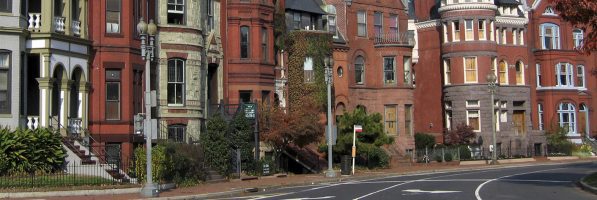Best Real Estate MBAs in the Northeast

While a career in real estate is not one of the most popular options for MBA graduates, it is a solid choice. The U.S. real estate industry pulls in over $166 billion in revenue each year, and markets in India, China, and other emerging economies are poised to expand. So, the question is, if you’re looking to go to school in the Northeast, where are the best MBA programs to help build a career in the industry? We’ve highlighted five of our favorite Northeast real estate programs below.
The Best Northeast Real Estate MBA Programs

The NYU Stern School of Business offers full-time MBA students a chance to specialize in real estate. According to the school, it “provides rigorous training in the development, investment, and financing of real estate projects.” Students who choose the specializing are taught to think strategically about real estate in primary and secondary markets including the legal, taxation, and regulatory environments they’ll encounter.
Real estate MBA curriculum includes classes such as:
- Real Estate Development and Entrepreneurship
- Real Estate Transactions
- Real Estate Investment Strategies
- Urban Systems
Real Estate Outside the Classroom:
- Center of Real Estate Finance: Established in 2012, the Center is dedicated to expanding the School’s course offerings and career services in real estate. It’s open to both MBAs and undergraduates alike and offers monthly events, research and more.
- MBA Real Estate Club: The Stern Real Estate Club (SREC) offers guest lectures, panel discussions, mixers, site visits, and case competitions for MBA students interested in expanding their real estate experience and insight.

The Georgetown University McDonough School of Business also offers a specialization in real estate for MBA students, which can include an intensive learning experience (ILE) in real estate development. ILEs are elective courses that offer client-centered work and experiential learning opportunity off campus in a concentrated time format.
MBA students interested in real estate can take courses in:
- Real Estate Private/Public Equity
- Real Estate Private/Public Debt
- Negotiations
- Fixed Income Analysis
Real Estate Outside the Classroom
- Steer Center for Global Real Estate: The Steers Center “offers students unparalleled access to the real estate industry at a global level.” Students gain hands-on experience with the D.C. real estate market through a range of activities from alumni mentoring to internships, job contacts, and more.
- Real Estate Industry Career Coach: Georgetown offers a career coach with specific industry knowledge and relationships in real estate. This career coach will help MBA students with their resume, cover letter, mock interviews, and networking strategy.

At The Wharton School, MBA students can major in real estate. This major includes two required courses in real estate investment and real estate development. The goal of the major is to “prepare students to be leaders in the real estate industry” and provide the necessary quantitative and qualitative tools to be successful. Offered since 1985, the major has grown in scope and size over the years.
Additional courses in real estate that Wharton MBA students can enjoy:
- Global Real Estate: Risk, Politics, and Culture
- Urban Real Estate Economics
- Real Estate Law
- Real Estate Entrepreneurship
Real Estate Outside the Classroom
- Samuel Zell & Robert Lurie Real Estate Center: Each year, the Real Estate Center sponsors conferences, seminars, and special programs for students and faculty interested in real estate. Established in 1983, it promotes excellence in real estate education and research.
- Wharton Real Estate Club: The Wharton Real Estate Club provides career development, mentorship, and networking opportunities for students at Wharton. Of particular note are the treks and tours that allow students to meet prospective employers, visit project sites, and gain first-hand experience.

The Columbia Business School’s MBA Real Estate program “provides students an unparalleled opportunity to expand their entrepreneurial skills while focusing on real estate finance and investment management.”
The program encourages students to view real estate as both a physical and financial product by emphasizing a blend of theory and practice. Throughout the curriculum, students work on 65-plus proprietary real estate business cases taught by real estate professionals.
The real estate curriculum differs every term, but it includes courses such as:
- Real Estate Finance
- Real Estate Transactions
- Real Estate Portfolio Management
- Social Impact Real Estate Investing and Development
Real Estate Outside the Classroom
- Paul Milstein Center for Real Estate: The Center for Real Estate integrates the theoretical and practical knowledge of real estate. It offers regularly hosted events including panel discussions, conferences, alumni career breakfasts, and symposiums
- Fellowships & Scholarships: Uniquely, Columbia offers multiple fellowships and scholarships for MBA students interested in real estate. Awards can be as much as $50,000 a year and are both merit-based and need-based.

Full-time MBA students at the Rutgers Business School can customize their education with a real estate concentration. In total, students who choose this path will take six courses in real estate including strategic management. They can also pursue a dual concentration in finance and real estate, which requires them to take a course in aggregate economic analysis.
Other potential real estate courses that MBA students can take, include:
- Real Estate Finance
- Real Estate Capital Markets
- Market Analysis and Valuation
- Property Management and Real Estate Investment Management
Real Estate Outside the Classroom
- Center for Real Estate: The Rutgers Center for Real Estate is a dynamic hub for students, academics, and professionals. It aims to educate, research, and exchange ideas on real estate. Currently, more than 95 real estate professionals lend their influence to the Center.
- Rutgers Real Estate Club: The Club is a “place for people interested in real estate, internships, and everything business. It brings together experienced speakers for a variety of events and opportunities.
Upcoming December MBA Application Deadlines

As winter approaches and December comes into clear view, let’s review all the major upcoming MBA application deadlines for December and January. Get those applications in ASAP so you have more time to enjoy the holidays with friends and family as you await your acceptance letter in 2019. Best of luck, and Happy New Year in advance! Continue reading…
The Best Healthcare Management Programs in Washington DC

Healthcare management is among the fastest growing jobs in the United States today. According to the U.S. Bureau of Labor Statistics, a 20 percent increase is expected for jobs the field of medical and health service management over the next ten years. Given that the average growth rate for all other occupations is just 7 percent, this reveals a significant boost expected within this field.
Given how quickly this field is growing, jobs in healthcare management can be competitive. One of the best ways to set yourself apart in the job market is with a specialized degree in healthcare management, demonstrating to employers that you have the specific skill set the job requires. If you are eager to join this growing industry, or looking for a career path that allows you to combine a passion for business with a love of medicine, you may want to pursue a degree in healthcare management.
Many business schools offer MBAs with specializations in healthcare management, or offer other options for customizing your degree to gain credentials in the field.
The Top Washington DC Healthcare Management MBA Programs.
George Washington University School of Business
The School of Business at the highly ranked George Washington University offers an online healthcare MBA program, which combines the generalized business foundation learned during the school’s MBA program with healthcare focused electives. The program explores the most important concepts in business and healthcare amidst a rigorous and hands-on educational environment. In addition to earning an MBA in healthcare management, students may also choose to pursue an additional certificate in fields like Clinical Research Administration, Clinical & Translational Research, Health Care Quality, Integrative Medicine, and more.
The online healthcare MBA at George Washington is 55.5 credit hours, divided among core courses (31.5) and healthcare focused electives (24), offered through the university’s School of Medicine and Health. Students may also petition to have 12 of their elective credits made up of GWU graduate-level healthcare courses outside of the medical school.
Just a few of the many healthcare elective courses offered through SOMHS are listed below:
- Patient Safety Systems
- Issues and Trends in Health Systems
- Introductions to Global Regulatory Affairs
- Regulatory Strategy in the Development of Drugs and Biologics
McDonough School of Business – Georgetown University
The McDonough School of Business at Georgetown University takes their healthcare and business education combo to a new level with the dual MBA and MD program. Within just five years, students will graduate with two degrees; one in medicine and one in business.
The program is broken down with different requirements each year, focused primarily on MD courses at the start, but including at least one MBA core course during the evening each semester. Students will take MBA elective courses throughout the fourth and fifth years, eventually completing the Global Business Experience in the final year. Students interested in the joint MBA/MD program at McDonough must be accepted both by the School of Medicine as well as McDonough before enrolling.

Georgetown University’s precious mascot, Jack, shortly after earning his degree at the School of Medicine / Photo via Georgetown
Student testimonials comment on the way the program has shaped their way of thinking and creatively problem solving. “I am confident that much of what I have gained at the business school will aid me in my career as a physician and will certainly enhance opportunities to improve the healthcare system as a physician-leader,” commented Mark Matza, MD/MBA 2014.
University of Maryland R.H. Smith School of Business
While the R.H. Smith School of Business at the University of Maryland does not offer an MBA concentration in healthcare management, they offer students the opportunity to jointly pursue an MBA and a Master of Science (MS) with a Health Services Leadership and Management specialty. The degree is designed to prepare students for a role as an administrator within a health care system, with the ability to make management-level decisions on a variety of fronts, including strategic planning, governance, and finance. The business education provided by the MBA will also provide students with a strong foundation in leadership and innovation that will allow students to take the lead in designing new approaches to healthcare services. Students with this degree could serve in a variety of roles within the healthcare field, such as a chief nursing officer, consultant, finance officer, and more.
The 68 credit program will be completed over the course of four years, with the MBA requirements mostly being completed in the first two years, and the MSN courses in years three and four.
What Are The Best Washington DC Real Estate MBA Programs?

The U.S. capital, Washington DC, boasts one of the hottest real estate markets in the world. Several variables combine to make this market so interesting, such as a highly affluent and highly transient population, as well as height restrictions on its buildings (so that no building exceeds the height of the Washington Monument), which limits density-related housing shortages. These factors combined with the city’s convenient location on the 95 corridor make DC metro the perfect location for MBA’s looking for a future in real estate.
Below, we’ve laid out three of our favorite Washington DC real estate MBA programs.
The Best Washington DC Real Estate MBA Programs
University of Maryland R.H. Smith School of Business
Students at the University of Maryland’s Smith School of Business (known more affectionately as UMD Smith) can pursue a dual MBA and Masters of Real Estate Development (MRED). Grads carry our their MBA at Smith, and fulfill their MRED requirements via evening classes at the school’s central campus at College Park. The 74-credit dual degree can be completed in two or two and a half years, and involves 42 MBA credits and 32 MRED credits.

The 74-credit MBA/MRED dual degree at UMD Smith sets up real estate hopefuls with a unique skillset.
The MBA/MRED imbues students with more than a bottom line view of their industry. According to the school, the MRED curriculum focuses on “economic viability, environmental respect, social responsibility, and beautiful design.” These elements of the MRED combined with the business acumen gleaned from an MBA education pave the way for well-rounded industry leaders.
McDonough School of Business – Georgetown University
Georgetown McDonough MBA’s benefit from access to the Steers Center for Global Real Estate, which provides students with the resources they need to acquire a nuanced understanding of global real estate. MBA’s with a bent toward real estate can take one class for each of the four quadrants in real estate teaching: public equity, public debt, private equity, and private debt. They can also take the four additional modules within the Real Estate Clinic, which exposes students to live real estate transactions in U.S. markets. The clinic gives students the opportunity to underwrite investments being considered by commercial real estate firms.
George Mason University School of Business
For prospective real estate MBA’s in search of a program built to accommodate school/life balance, the George Mason University School of Business offers an MBA with a real estate emphasis. After MBA’s complete their core classes, they must complete 15 elective credits, which they can individually tailor to their own preferences. George Mason is an ideal option for those with full time jobs or family obligations, in pursuit of a higher degree that will not force them to neglect MBA other full-time commitments. Students can choose to complete their MBA on campus or online, depending on their preference and what their schedule permits. The flexibility of this program does not negate the impact of the degree. In fact, 98 percent of the class of 2017 was employed by graduation.

The George Mason hybrid MBA, which can specialize in real estate, yields an astounding 98 percent employment rate by graduation.
Georgetown Launches New MBA Certificate in Consumer Analytics and Insights

In response to overwhelming demand by students and recruiters, Georgetown University’s McDonough School of Business launched a new MBA Certificate in Consumer Analytics and Insights. The certificate delves deep into marketing data and analytics to provide MBA students with the necessary skills needed to drill down into consumer behavior and marketing practice through data. Continue reading…
How Affordable are Baltimore MBA Programs Compared to DC?

A few years ago, the Baltimore Sun published a hilarious list outlining 100 reasons why Baltimore is a better city than Washington DC. Here are some of our favorite reasons:
- We don’t start conversations by asking, “What do you do?” or “Who do you work for.”
- It never takes us 45 minutes to go six miles.
- Our traffic doesn’t lead to clinical depression.
- D.C.’s happy hour is regular price to us.
- Our signature food is crab cakes and pit beef. D.C. has … yeah.
- We weren’t built on a swamp.
- Cal Ripken is 2,632 times better than any D.C. sports figure.
- The NATIONAL Aquarium: Not in the nation’s capital.
Yes, some of these reasons are very tongue-in-cheek, and the list aimed to be light-hearted and irreverent. But if you’re a prospective MBA in the DMV, there are some clear advantages to picking a business school in the Baltimore metro over the Washington DC metro, namely the affordability of programs.
Let’s take a deeper dive and see just how affordable Baltimore MBA Programs are compared to their DC counterparts.
Which MBAs Can You Earn in Baltimore and DC?
Both Baltimore and Washington DC are home to some of the country’s most prestigious business schools and MBA programs. Programs offered in the Baltimore metro include:
- Perdue School of Business – Salisbury University
- Carey Business School – Johns Hopkins University
- Sellinger School of Business – Loyola University Maryland
- University of Baltimore – Merrick School of Business
- University of Maryland R.H. Smith School of Business
Meanwhile, MBA programs offered in the Washington DC Metro include:
- George Mason University School of Business
- George Washington University School of Business
- Howard University School of Business
- Kogod School of Business – American University
- McDonough School of Business – Georgetown University
How Affordable are Baltimore’s Programs Compared to DC’s?
Yes, both metros boast and impressive programs that are sure to provide prospective MBAs with a high-quality business educations, but which city offers the more affordable options?
Here is the average cost per credit hour at business schools in Baltimore.
- Carey Business School Global MBA: $2,174 per credit hour
- Perdue School of Business Full-Time MBA: $392 per credit hour (in-state students), $703 per credit hour (out-of-state students)
- Sellinger School of Business Full-Time MBA: $1,238 per credit hour
- Merrick School of Business Flexible MBA: $824 per credit hour (in-state students), $1,149 per credit (out-of-state students)
- R.H. Smith School of Business Full-Time MBA: $1,658 per credit hour (in-state students), $1,998 per credit (out-of-state students)
Let’s compare these tuitions rates to the MBA offerings in the Washington DC area:
- George Mason University School of Business Full-Time MBA: $950 per credit hour (residents of Virginia, Maryland, and Washington DC), $1,751.50 per credit hour (out-of-state and international students)
- George Washington University School of Business Global MBA: $1,837 per credit hour
- Howard University School of Business Full-Time MBA: $1,259 per credit hour
- Kogod School of Business Full-Time MBA: $1,642 per credit hour
- McDonough School of Business Full-Time MBA: $1,880 per credit hour
When looking at tuition costs, Baltimore takes the cake. Even though Baltimore boasts the most expensive full-time program (Carey Business School Global MBA), the average cost per credit hour for both in-state and out-of-state students is about 16 percent lower in Charm City.
Washington DC vs. Baltimore MBA Cost
| Baltimore | Washington DC | |
|---|---|---|
| In-State Cost (per credit hour) | $1,257.20 | $1,513.60 |
| Out-of-State Cost (per credit hour) | $1,452.40 | $1,673.90 |
Additional Costs To Consider
Aside from tuition, business students living in the Baltimore area have a lower cost of living then their Washington DC counterparts. According to Numbeo, you would need around $4,541 in Baltimore to maintain the same standard of life that you can have with $6,100 in Washington DC, assuming you rent in both cities. This calculation uses the website’s Cost of Living Plus Rent Index to compare cost of living.
Here’s a closer look at how Numbeo creates its Cost of Living Indexes, and a breakdown of a few key stats to look at when comparing Baltimore to Washington DC:
- Consumer Prices in Baltimore, MD are 14.78 percent lower than in Washington DC
- Rent Prices in Baltimore, MD are 39.97 percent lower than in Washington DC
- Groceries Prices in Baltimore, MD are 15.70 percent lower than in Washington DC
- Local Purchasing Power in Baltimore, MD is 10.21 percent lower than in Washington DC
The case for Washington DC
So Baltimore’s MBA offerings are, on average, more affordable than Washington DCs. But what if money isn’t an issue, or you happen to get into a program in DC? Here are a few ways that the Capital City has the Monument CIty beat, according to Thrillist:
- Culinary Scene: DC is experience a craft beer renaissance with four breweries opening in recent years: DC Brau, 3 Stars Brewing, Chocolate City, and Bluejacket (soon). Meanwhile, notable restaurants such as minibar (Andres), Le Diplomate (Starr), Kapnos (Isabella), Range (Voltaggio), and Casa Luca (Trabocchi) have also opened. Baltimore isn’t really known as much of a foodie town.
- Public Transit: The Metro is one of the most efficient, most convenient, and cleanest public rail lines in the country. Baltimore’s metro runs East to West only, and doesn’t link up with either of the two other rail systems.
Oh, and remember that Baltimore Sun article we reference at the top of the page? Enjoy DC Inno’s slightly more punchy response.
